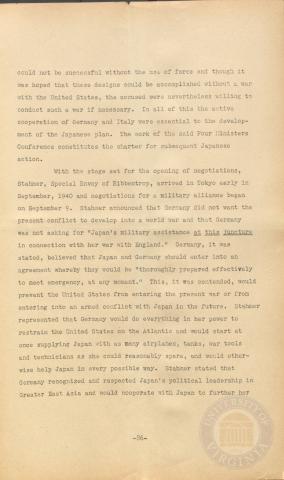
Page 86
| Parent | Japanese - German - Italian Collaboration |
|---|---|
| Date | |
| Language | English |
| Collection | Tavenner Papers & IMTFE Official Records |
| Box | Box 14 |
| Folder | Japan, Germany, Italy Collaboration and Introduction |
| Repository | University of Virginia Law Library |
could not be successful without the use of force and though it was hoped that these designs could be accomplished without a war with the United States, the accused were nevertheless willing to conduct such a war if necessary. In all of this the active cooperation of Germany and Italy were essential to the develop¬ment of the Japanese plan. The work of the said Four Ministers Conference constitutes the charter for subsequent Japanese action.
With the stage set for the opening of negotiations, Stahmer, Special Envoy of Ribbentrop, arrived in Tokyo early in September, 1940 and negotiations for a military alliance began on September 9* Stahmer announced that Germany did not want the present conflict to develop into a world war and that Germany was not asking for "Japan's military assistance at this .juncture in connection with her war with England." Germany, it was stated, believed that Japan and Germany should enter into an agreement whereby they would be "thoroughly prepared effectively to meet emergency, at any moment." This, it was contended, would prevent the United States from entering the present war or from entering into an armed conflict with Japan in the future. Stahmer represented that Germany would do everything in her power to restrain the United States on the Atlantic and would start at once supplying Japan with as many airplanes, tanks, war tools and technicians as she could reasonably spare, and would other¬wise help Japan in every possible way. Stahmer stated that Germany recognized and respected Japan's political leadership in Greater East Asia and would cooperate with Japan to further her
